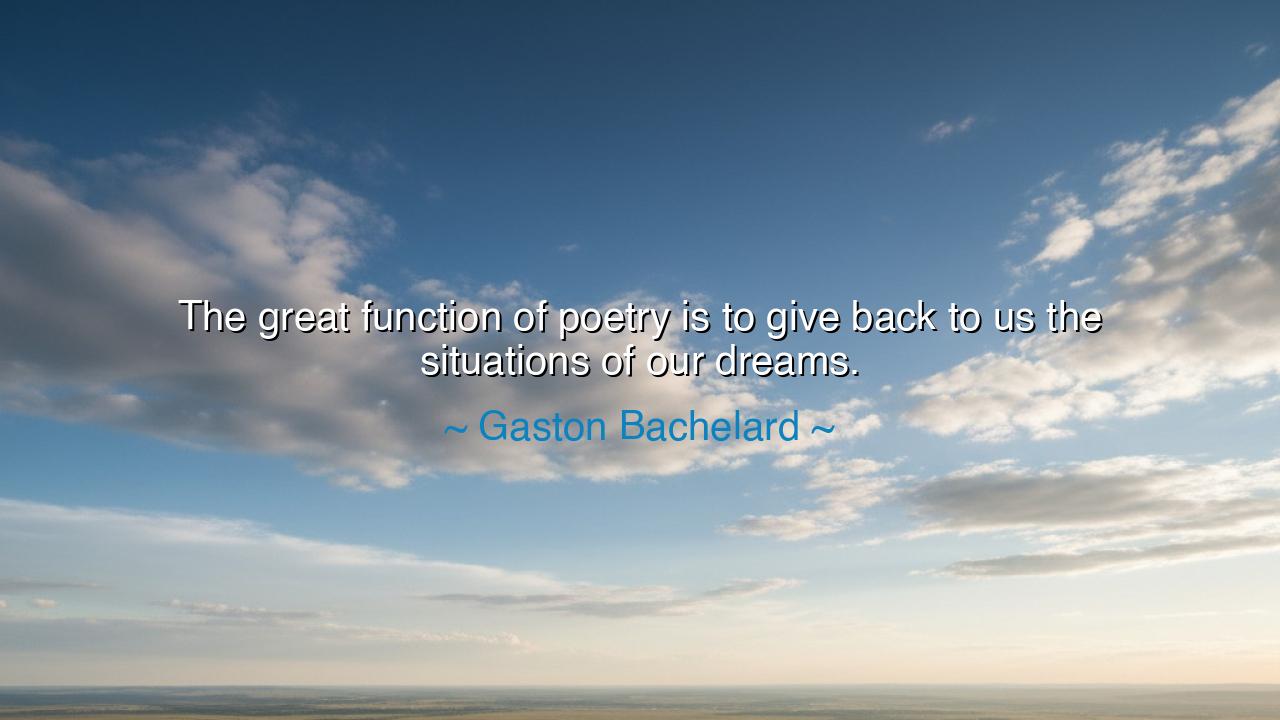
The great function of poetry is to give back to us the situations






“The great function of poetry is to give back to us the situations of our dreams.” — Gaston Bachelard
In these luminous words, Gaston Bachelard, the French philosopher of imagination and reverie, unveils the sacred purpose of poetry. To him, poetry was not merely an ornament of language or a craft of rhythm—it was a mirror of the soul, restoring to us what waking life too often steals: the dreamlike state of wonder that once shaped our earliest perceptions of the world. When he declares that the great function of poetry is to “give back to us the situations of our dreams,” he speaks as a prophet of imagination, reminding us that through poetic vision, the boundaries between dream and reality grow thin, and we rediscover the forgotten truths of our inner life.
The origin of this quote lies in Bachelard’s lifelong study of imagination and the poetic image. In works such as The Poetics of Reverie and The Poetics of Space, he explored the way that poetry allows us to re-enter the world of childhood imagination—a world where houses breathe, rivers remember, and silence speaks. To Bachelard, poetry is not escape; it is return. It returns us to the primal intimacy between self and world, where thought and dream are one. The poet, then, becomes a guide through the landscapes of the subconscious, transforming fleeting visions into language that awakens our sleeping depths.
To say that poetry “gives back the situations of our dreams” is to affirm that it restores our capacity to feel mythically. Dreams, after all, are the theater of the soul: they reveal our longings, our fears, our hidden unity with all creation. Yet in the noise of the waking world, we forget them; we lose our inward gaze. Poetry brings them back—not as vague images of sleep, but as living symbols, renewed and radiant. A single verse can return us to that ancient realm where stars had voices, where love was infinite, and where we ourselves were both the dreamer and the dream.
Consider the poet William Blake, whose visions of angels and burning tigers were not mere fantasy but revelations of the imagination’s divine fire. In his prophetic poems, the world becomes transparent; the material and the spiritual interpenetrate. He did not invent new dreams—he remembered them, and in remembering, gave them back to humanity. Blake saw, as Bachelard later taught, that poetry reawakens what reason forgets: the sense that reality itself is alive with meaning. Through poetry, the invisible becomes visible; the ordinary becomes sacred once more.
Even in more recent times, we find this truth alive in the work of Pablo Neruda, whose verses about love, the sea, and the simplest of things—the onion, the stone, the leaf—transform the mundane into the miraculous. Neruda’s poetry, like Bachelard’s philosophy, returns us to wonder. It reminds us that life, stripped of imagination, is barren, but when seen through poetic eyes, it glows again with the colors of dream. When we read such poems, we do not merely understand them—we are transported into a state of reverie, where memory, desire, and the eternal now converge.
But Bachelard’s teaching reaches beyond literature; it touches the essence of being human. Every person carries within them a world of dreams—visions of love, freedom, beauty, and peace—that daily life buries beneath habit and fear. Poetry, whether written or lived, is the act of reclaiming that world. It teaches us to see again with the soul’s eyes, to listen not only to what is said, but to what is felt beneath the silence. When we read or create poetry, we step once more into the cosmic rhythm from which we came—the rhythm of the heart, the earth, and the divine imagination that birthed them both.
The lesson, then, is timeless and profound: do not lose your dreams. Let poetry—whether through words, music, or the simple act of living beautifully—restore them to you. Read not only with the mind but with the heart. Speak not only to communicate, but to enchant, to breathe life into the invisible. Write, paint, sing, or simply watch the rain as a poet would—feeling how it stirs both memory and mystery. For in those moments, you fulfill Bachelard’s vision: you reclaim the situations of your dreams and rejoin the ancient dance of creation.
So, O seeker of the inner world, remember this: poetry is the dream made visible. It reminds us that we are not strangers in the cosmos but participants in its imagination. Live poetically—not by escaping reality, but by deepening it, by seeing in every moment the echo of something eternal. For when you do, life itself becomes the greatest poem, and the dreams of the soul return, shimmering, to the waking heart.






AAdministratorAdministrator
Welcome, honored guests. Please leave a comment, we will respond soon